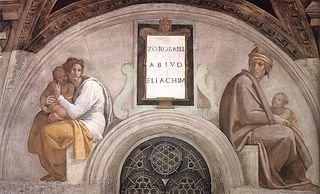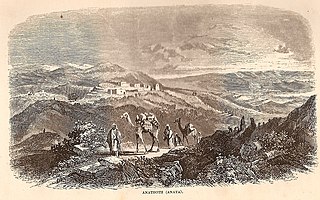Related Research Articles
Abijah is a Biblical Hebrew unisex name which means "my Father is Yah". The Hebrew form Aviyahu also occurs in the Bible.
Abihail may refer to one of five different people mentioned in the Bible:

There are two biblical characters named Abihud.
Ahihud is the name of two biblical figures. In English, both figures are called "Ahihud," which represents two different names in Hebrew.
Ahijah is a name of several biblical individuals:
- Ahijah the Shilonite, the Biblical prophet who divided the Kingdoms of Israel and Judah.
- One of the sons of Bela. In AV (KJV) called "Ahiah."
- One of the five sons of Jerahmeel, who was great-grandson of Judah.
- A Pelonite, one of David's heroes ; called also Eliam.
- A Levite having charge of the sacred treasury in the temple.
- One of Solomon's secretaries.
- Son of Ahitub, Ichabod's brother; the same probably as Ahimelech, who was High Priest at Nob in the reign of Saul and at Shiloh, where the Tabernacle was set up. Some, however, suppose that Ahimelech was the brother of Ahijah, and that they both officiated as high priests, Ahijah at Gibeah or Kirjath-jearim, and Ahimelech at Nob.
- Father of King Baasha of Israel

Ahimelech was an Israelite priest and served as the grand priest of the town of Nob. In the Book of Samuel, he was described as the son of Ahitub and father of Abiathar, but described as the son of Abiathar in 2 Samuel 8:17 and in four places in 1 Chronicles. He descended from Aaron's son Ithamar and the High Priest of Israel Eli. In 1 Chronicles 18:16 his name is Abimelech according to the Masoretic Text, and is probably the same as Ahiah.
Ahoah ("brotherly") was one of the sons of Bela, the son of Benjamin. He is also called Ahiah and Iri. His descendants were called Ahohites.
Ammihud is the name of several Hebrew Bible figures:

Anathoth is the name of one of the Levitical cities given to "the children of Aaron" in the tribe of Benjamin. Residents were called Antothites or Anetothites.
Uzzi is a given name. One derivation is biblical, from Uzzî meaning "my strength". The name can also be transliterated as Uzi. It may be a nickname for Uzza/Uzzah, Uzzia/Uzziah, and Uziel/Uzziel.
Pashur or Pashhur was the name of at least two priests contemporary with the prophet Jeremiah and who are mentioned in the Book of Jeremiah. The name is of Egyptian origin, Pš-Ḥr.
Ophrah, is a name in the Hebrew Bible meaning "a fawn" given to:

Moriah is the name given to a mountain in the Book of Genesis, where the binding of Isaac by Abraham is said to have taken place. Jews identify the region mentioned in Genesis and the specific mountain in which the near-sacrifice is said to have occurred with "Mount Moriah", mentioned in the Book of Chronicles as the place where Solomon's Temple is said to have been built, and both these locations are also identified with the current Temple Mount in Jerusalem. The Samaritan Torah, on the other hand, transliterates the place mentioned for the binding of Isaac as Moreh, a name for the region near modern-day Nablus. It is believed by the Samaritans that the near-sacrifice actually took place on Mount Gerizim, near Nablus in the West Bank.

Joab the son of Zeruiah, was the nephew of King David and the commander of his army, according to the Hebrew Bible.

Ephraim was, according to the Book of Genesis, the second son of Joseph ben Jacob and Asenath, as well as the adopted son of his biological grandfather Jacob, making him the progenitor of the Tribe of Ephraim.

Ish-bosheth, also called Eshbaal was, according to the Hebrew Bible, the second monarch of the Kingdom of Israel. After the death of his father, Saul, Ish-bosheth ascended to the throne and reigned for two years.
Kirjathaim, meaning in Hebrew "town" or "city".
Meshullam is a biblical masculine name meaning "Befriended".

Manasseh or Menashe was, according to the Book of Genesis, the first son of Joseph and Asenath. Asenath was an Egyptian woman whom the Pharaoh gave to Joseph as wife, and the daughter of Potipherah, a priest of On. Manasseh was born in Egypt before the arrival of the children of Israel from Canaan.
References
![]() This article incorporates text from a publication now in the public domain : Easton, Matthew George (1897). "Alemeth". Easton's Bible Dictionary (New and revised ed.). T. Nelson and Sons.
This article incorporates text from a publication now in the public domain : Easton, Matthew George (1897). "Alemeth". Easton's Bible Dictionary (New and revised ed.). T. Nelson and Sons.